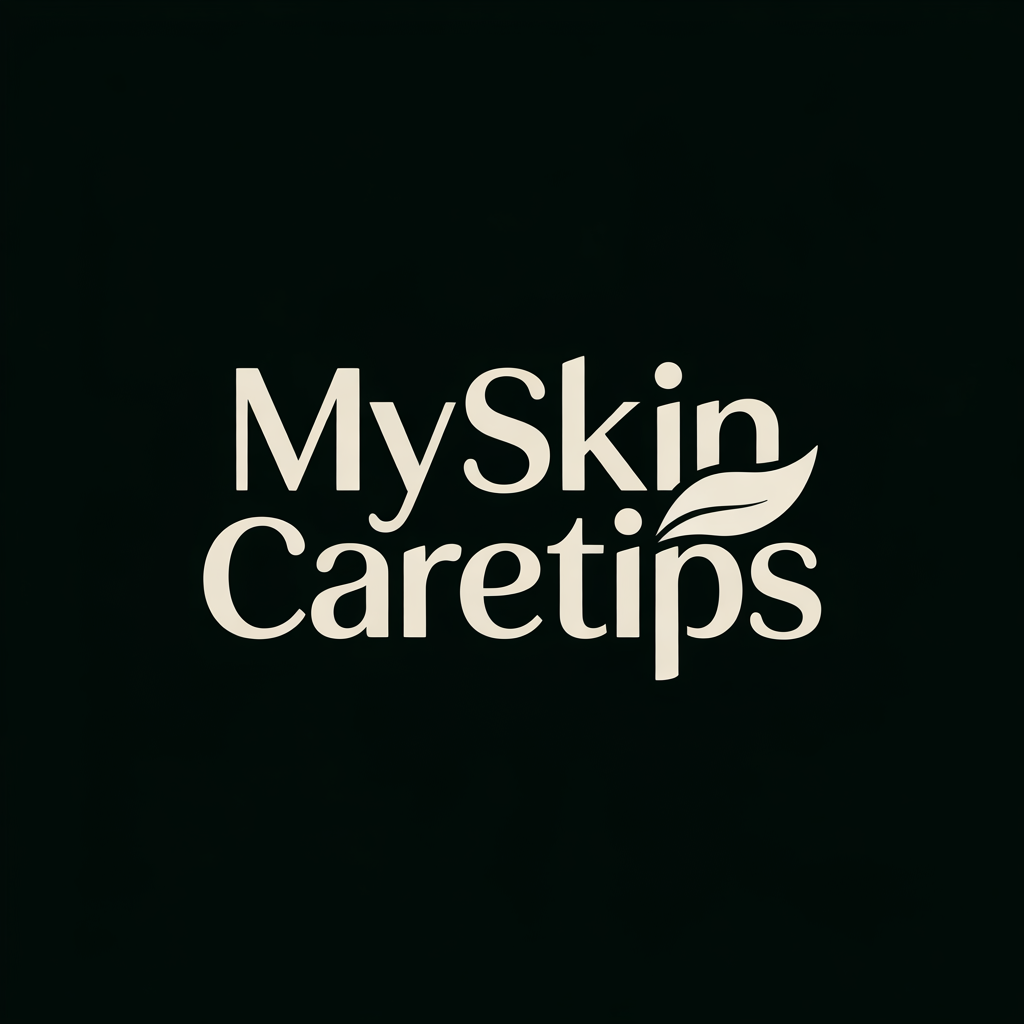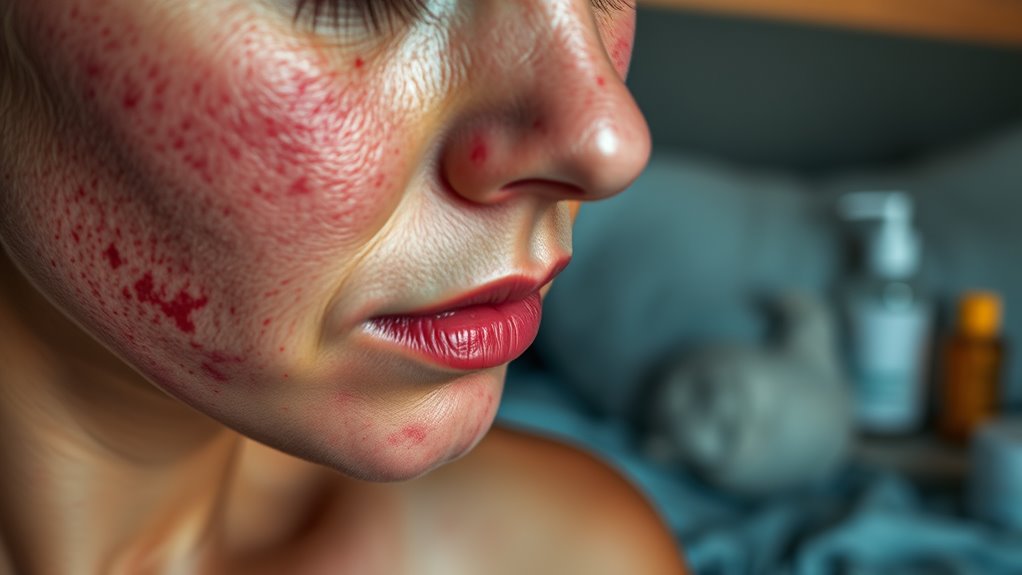Why Your Skin Hates Your Night Routine (Without You Knowing It)
You might not realize it, but your night routine could be secretly sabotaging your skin’s health. Skipping double cleansing lets makeup and pollutants clog pores, fostering breakouts and dullness, while overloading on active ingredients overwhelms your barrier, causing irritation and sensitivity. Inconsistent schedules disrupt natural repair, and using the wrong products for your skin type just adds to the damage. Stick around to discover simple fixes for a radiant complexion.
Key Takeaways
- Sleeping with makeup clogs pores and promotes bacterial breakouts.
- Skipping double cleansing leaves residues that accelerate skin aging.
- Applying products in the wrong order blocks absorption and reduces efficacy.
- Overloading with active ingredients irritates the skin barrier and causes inflammation.
- Inconsistent routines disrupt the skin’s natural repair and cell turnover processes.
Common Mistakes in Product Application
When you’re applying products in your night skin routine, it’s easy to overlook common mistakes that hinder results. In night skincare, applying products in the wrong order—such as layering heavy creams before lightweight serums—blocks absorption and diminishes benefits, as supported by dermatological studies. Incorporating proper skincare layering can significantly enhance the benefits of your routine.
You disrupt efficacy when you skip this sequence; always start with water-based formulas followed by oils or balms for deeper penetration.
Another common error is over-application: using excessive amounts clogs pores and irritates skin, countering the purpose of night skincare. Evidence from clinical trials shows that a pea-sized amount suffices for most products, promoting balance without waste.
Additionally, hasty application prevents ingredients from activating; gently massage in circular motions to enhance circulation and results. By correcting these habits, you’ll maximize your routine’s potential for radiant, healthy skin.
Furthermore, these mistakes can lead to skin irritation, making it essential to adopt a more mindful approach for overall skin health.
The Effects of Skipping Double Cleansing
If you skip double cleansing, you’ll likely end up with clogged pores from leftover dirt and makeup.
This buildup heightens your breakout risks, as bacteria thrive in unremoved residues.
Over time, it also leaves your complexion looking dull by preventing skin cell turnover.
Moreover, integrating a balanced morning routine can help support overall skin health and recovery.
Additionally, overlooking hydration practices, such as skipping moisturizer, can worsen these skin issues by compromising overall barrier function.
Clogged Pores
Skipping double cleansing in your night routine often clogs pores by leaving behind oil, makeup, and impurities that build up overnight.
This residue traps debris deep within your pores, enlarging them and creating a dull, uneven texture that ages your skin prematurely.
Studies from dermatological journals confirm that inadequate cleansing disrupts your skin’s natural barrier, leading to inflammation and reduced elasticity.
You’re not just dealing with surface issues; this congestion impairs your skin’s ability to regenerate, making it look tired and less vibrant.
To fix this, always use a gentle oil-based cleanser first, followed by a water-based one—it’s a practical habit that maintains pore health and promotes a smoother complexion.
Don’t overlook this step; your skin will thank you for the long-term clarity it provides.
Breakout Risks
Neglecting double cleansing heightens your breakout risks by allowing oil and impurities to linger, fostering bacterial growth that inflames pores and triggers acne.
You’re essentially letting residue from makeup, sunscreen, and environmental pollutants build up, creating a feast for acne-causing bacteria like P. acnes, which multiply and produce inflammatory compounds.
This leads to clogged pores evolving into painful papules, pustules, or cysts, as supported by dermatological research showing that inadequate cleansing correlates with higher acne incidence.
To counteract this, incorporate a two-step process: first, use an oil-based cleanser to break down oils, then a foaming one to remove water-soluble grime.
You’ll reduce bacterial proliferation and minimize flare-ups, keeping your skin clearer and more resilient with consistent effort.
Dull Complexion
Failing to double cleanse regularly leaves a buildup of dead skin cells and pollutants on your surface, quickly dimming your complexion’s natural radiance. This residue clogs pores and hinders cell turnover, making your skin appear lackluster and uneven. Studies show that consistent double cleansing removes up to 90% more impurities, as confirmed by dermatological research.
| Aspect | Effects of Skipping | Benefits of Double Cleansing |
|---|---|---|
| Complexion | Dull and uneven | Brighter and more even |
| Texture | Rough and dry | Smooth and hydrated |
| Pore Health | Clogged pores | Clear and refined |
| Glow | Diminished radiance | Enhanced natural glow |
| Long-term Impact | Accelerated aging | Improved skin barrier |
Adopt this habit nightly—it’s a simple, evidence-backed step to reclaim your skin’s vitality and prevent premature dullness.
Overloading With Active Ingredients
While it’s tempting to layer multiple active ingredients like retinol and AHAs into your night routine for faster results, this can overwhelm your skin’s barrier and trigger irritation.
Dermatological studies show that combining these can disrupt the skin’s microbiome, increasing inflammation and sensitivity, which you might mistake for a breakout. You heighten the risk by ignoring compatibility; for instance, retinol paired with AHAs raises pH levels, weakening defenses and causing dryness.
To avoid this, you should rotate products weekly, starting with one active at low concentrations. Experts recommend patch testing first and observing reactions over days. This strategy aligns with preventing common mistakes for overall skin health.
Moreover, excessive cleansing routines, such as twice-daily washing, can similarly throw off your skin’s moisture balance and exacerbate breakout triggers, making it essential to maintain a balanced approach overall.
Neglecting Hydration and Barrier Repair
After addressing the risks of overloading active ingredients, you often skip the vital step of hydrating your skin and repairing its barrier, which leaves it exposed to damage overnight. This neglect disrupts your skin’s protective layer, making it prone to irritation and accelerated aging, as backed by dermatological studies showing that a compromised barrier increases transepidermal water loss. By incorporating easy night skincare practices, you can achieve glowing skin effortlessly while keeping your routine simple and stress-free.
To make this relatable, here’s a practical guide:
| Common Mistake | Why It’s Harmful | What to Do Instead |
|---|---|---|
| Skipping moisturizer | Weakens barrier, causing dryness | Apply a ceramide-rich cream |
| Using harsh products | Strips essential oils | Choose gentle, pH-balanced ones |
| Neglecting serums | Misses hydration boost | Use hyaluronic acid nightly |
| Ignoring occlusives | Accelerates water loss | Add facial oils for sealing |
| Over-cleansing | Irritates and inflames skin | Cleanse once with mild formulas |
Prioritize these steps to restore your skin’s resilience and wake up refreshed.
To further support your skin’s health, it’s essential to focus on soothing routines that emphasize avoiding key irritants for sensitive skin.
Sleeping With Makeup and Pollutants
You risk clogging your pores and inviting breakouts when you sleeping with makeup residue, as research links it to bacterial buildup. Eliminating such mistakes is key to achieving glowing skin.
Pollutants from your day accumulate on your skin, accelerating damage like oxidation and dullness.
These issues combine to trigger irritation, so you must cleanse thoroughly to protect your skin’s health.
Addressing common skincare mistakes is essential for maintaining a healthy skin barrier and preventing long-term damage.
Makeup Residue Risks
Sleeping with makeup on traps residues and pollutants against your skin, increasing the risk of clogged pores, breakouts, and accelerated aging.
This buildup creates a barrier that blocks your skin’s natural renewal process, as studies show that leftover foundation and powders harbor bacteria, leading to inflammation and uneven texture.
You’re essentially inviting free radicals from environmental pollutants to linger, which dermatologists link to collagen breakdown and fine lines.
To mitigate this, always double-cleanse with a gentle, oil-based remover followed by a foaming cleanser; it’s a simple step backed by clinical evidence.
Remember, your skin repairs itself at night, so removing makeup lets it breathe and recover effectively.
Prioritize this habit to maintain a clear, youthful complexion without unnecessary damage.
Pollutant Buildup Effects
Environmental pollutants worsen the damage from leaving makeup on overnight, as they embed into your skin and trigger inflammation, breakouts, and premature aging.
These tiny particles, like smog and dust, cling to your makeup residue, creating a barrier that blocks your skin’s natural repair process during sleep. Research shows they accelerate free radical damage, leading to collagen breakdown and uneven tone.
You’re essentially trapping toxins that promote oxidative stress, making your complexion dull and accelerating wrinkles.
To combat this, always cleanse thoroughly before bed—experts recommend a double-cleansing routine with a gentle, pollutant-fighting formula.
By prioritizing removal, you’ll reduce buildup risks and support your skin’s nightly regeneration, keeping it healthier long-term.
Don’t overlook this; your future glow depends on tonight’s habits.
Skin Irritation Causes
Irritation from sleeping with makeup and pollutants stems from their combined effects on your skin’s barrier.
Makeup clogs pores, trapping pollutants like PM2.5 particles, which studies show penetrate deeply and trigger inflammation. This disrupts your skin’s protective layer, leading to redness, breakouts, and accelerated aging—you’re essentially letting toxins feast overnight.
To combat this, always remove makeup thoroughly before bed using a gentle cleanser; research from the Journal of Investigative Dermatology confirms this reduces irritation risk by up to 50%.
Avoid heavy products in polluted areas; opt for antioxidants like vitamin C to neutralize free radicals.
Inconsistent Routine Schedules
Although you might think occasional skips won’t affect your skin, inconsistent routine schedules can disrupt its natural repair process overnight.
This irregularity interrupts your skin’s circadian rhythm, impairing cell turnover and collagen synthesis, which leads to issues like breakouts and dullness.
Research from dermatology experts confirms that steady habits optimize overnight recovery and barrier function. Incorporating actionable strategies from routine optimization can further enhance your skin’s resilience and long-term health.
-
Set a fixed nightly schedule: Choose a consistent time for your routine to align with your body’s natural cycles and promote better results.
-
Use habit-tracking tools****: Apps or journals help you monitor adherence, making it easier to spot and correct inconsistencies quickly.
-
Prioritize preparation: Lay out your products each evening to reduce barriers, ensuring you follow through and support long-term skin health.
To achieve transformative results, consider adopting a nighttime routine that includes essential steps for clearer, healthier skin.
Choosing the Wrong Products for Your Skin Type
Just as a consistent routine lays the groundwork for healthy skin, picking products that don’t match your skin type can sabotage your efforts. For example, you might overload oily skin with heavy creams, triggering breakouts, or strip dry skin with alcohol-based cleansers, leading to flakiness. Dermatologists emphasize matching formulations to your type for optimal results—it’s evidence-based and prevents long-term damage. As detailed in the story of unlocking radiant skin, identifying your skin type can lead to transformative skincare results.
By learning to master your skin type, you can enhance your ability to select the right products and achieve better skincare outcomes.
To guide you, here’s a breakdown:
| Skin Type | Common Mistake |
|---|---|
| Oily | Using oil-based moisturizers |
| Dry | Opting for harsh exfoliants |
| Combination | Ignoring zone-specific care |
| Sensitive | Choosing fragranced products |

